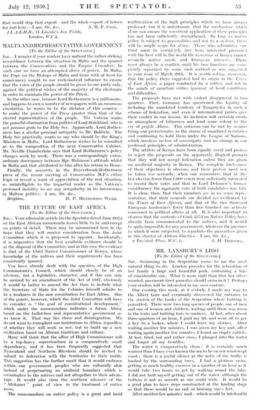THE FUTURE OF EAST AFRICA
[7'o the Editor of the SPECTATOR.] SIR,—Your admirable article (Mae Spectator dated June 28th) on the East African memoranda leaves little to be said except on points of detail. These may be summarized here in the hope that they will receive consideration front the Joint Committee which it is proposed to appoint. Incidentally, it is imperative that the best available evidence should be at the disposal of the Committee, and in this case the evidence is that of the Chief Native Commissioner of Kenya, whose knowledge of the natives and their requirements has been consistently ignored.
You have already dealt with the question of the High Commissioners Council, which should clearly be of an advisory, not a legislative, character, and if this can only be secured by an amendment of the Act of 1387, obviously it would be better to amend the Act than to include what the Secretary of State for the Colonies himself admits to be a weakness in the new constitution for East Africa. One of the points, however, which the Joint Committee will have to consider is " the goal of constitutional development:' which under the memorandum indicates a future Africa based on the ballot-box and representative government as we know it. That way lies chaos and disintegration. We do not want to transplant our institutions to Africa, regardless of whether they will work or not, but to build up a new civilization based on African traditions and culture.
Many will think that the office of High Commissioner will he a top-heavy superstructure in a comparatively small dependency, and it has been frequently suggested that Nyassaland and Northern Rhodesia should be invited to submit to federation with the territories to their north. This suggestion has the further merit that it would embrace within one government peoples who are culturally akin instead of perpetuating an artificial boundary which is meaningless to the natives and not altogether to their advan- tage. It would also stem the northern advance of the " Afrikaner" point of view in the treatment of native races.
The memorandum- on native policy is a great and lucid
reaffirmation of the high principles which we have always professed, but it is unfortunate that the mechanism which alone can ensure the consistent application of these principles has not been sufficiently strengthened. So long as native policy is subject to personalities and not to a system, there will be ample scope for abuse. Those who administer our trust must be completely free from interested pressure ; with the best will in the world the Governor of Kenya cannot reconcile native needs and European interest,. There must always be a conflict, until his two functions are com- pletely separated by some such method as was suggested in your issue of March 26th. It is worth noting. moreover, that the policy there suggested had its origin in the Times of East Africa, a paper conducted by a settler, and not in the minds of armchair critics ignorant of local conditions and difficulties. • The proposals have met with violent disapproval in two quarters. First, Germany has questioned the legality of including the mandated territory of Tanganyika in such a scheme of federation, anti even if international jurists give their verdict in our favour, its inclusion will certainly create an atmosphere of bitterness and lend some colour to the cry of perfide Albion. This criticism can be met by :I.:hai- l:it ing our protectorates to the status of mandated territories and continuing to hold them under the League of Nations, which involves no loss of sovereignty and no change in our professed principles of administration.
The settlers of Kenya have been equally vocal and profess to reject the proposals on the apparently illogical grounds that they will not accept federation unless they are given an unofficial majority in Kenya. The complete irrelevance of their objections is obvious, and their protest steed not lie taken too seriously, when one remembers that. at the last election fewer than 1,0(g) voters were sullicietit ly interested to record their votes and that in Lord Delamere's former constituency the aggregate vote of both candidates was 150. It is clear, then, that their members are in no sense repre- sentative, that their counsels are divided (as evidenced by the Times of East Africa), and that of the two thousand European landowners fewer than five hundred are actively concerned in political affairs at all. It is also important to observe that the contents of Cmd. 3573 on Native Policy have already been communicated to the natives, and it would be quite impossible for any government, whatever the pressure to which it were subjected, to repudiate the guarantees given in this charter of African liberties.-- I am, Sir, &e.,




































 Previous page
Previous page